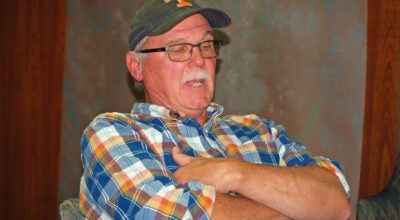Not a Crime: Film explores life of ‘philanthropic’ art forger
Published 10:29 am Monday, February 1, 2016
JOHNSON CITY – Using various guises and false identities, art forger Mark Landis has been wily enough to get more than 100 pieces of his art on the walls of nearly 50 museums in 20 states over a period of 30 years.
His body of work spans painting styles and periods and includes visual art icons, ranging from Picasso to Dr. Seuss, yet Landis remains “at large” – because he hasn’t really committed a crime. He donated the forged masterpieces. “I didn’t do anything wrong or illegal,” Landis says.
On Monday, Feb. 8, at 7 p.m. in Ball Hall Auditorium, the Mary B. Martin School of the Arts at East Tennessee State University will present the film “Art and Craft” – with director/producer Sam Cullman and subject of the film Mark Landis in attendance – as a part of the South Arts Southern Circuit Tour of Independent Filmmakers. The documentary film is free and open to the public and will be followed by a Q&A and reception with Cullman and Landis.
“Rich and fascinating … it’s got a crisp pace and a deadpan playfulness, telling a too-good-to-be-true story with humor and empathy,” reports the “Epoch Times.”
When the story broke in “The New York Times” about the most prolific art forger in United States’ history, filmmakers Cullman and Jennifer Grausman say they knew that his story needed to be told. Landis, it turns out, was hiding in plain sight at his mother’s house in Mississippi, the directors say, and was “remarkably transparent” and open about his habit. After meeting Landis, they realized the story was much more complex than they had originally thought.
“‘Art and Craft’ uncovers a unique story of obsession that falls at the intersection of authenticity and identity,” the filmmakers say in their directors’ statement. “This intimate character study opens a window onto the disarmingly eccentric world of one man, but in doing so uncovers something much more universal – the search for meaning and purpose.”
The documentary tells the story of Landis and his successful 30-year con of regional art galleries – successful, that is, until he dupes art registrar Matthew Leininger who vows to expose Landis’ “philanthropy.” Starting out as an art mystery, the documentary becomes a story of one man’s battle against mental illness and the lengths one might go to find acceptance.
“Was he a Robin Hood? Was he trying to give art to the masses? Was he some sort of rejected artist trying to get back at the art world?” asks Cullman in a Tribeca Film Festival interview. “In the end it was actually none of those things and maybe all of those things. But it became a much deeper story …
“[Duped curators] kind of treated him as if he were a villain with malicious intent, and really that was actually not the case so … Mark became a much more deep and complex character once we realized those sort of classic motivations that would motivate a forger didn’t apply.”
After being diagnosed with schizophrenia and multiple behavior disorders in the 1970s, Landis sought to overcome the marginalization associated with these diseases, devising a plan that allowed him to gain respect among the elites of society: art forgery. What makes Landis’ plan unique is that he has never sold a painting, posing instead as a philanthropist, a priest or a grieving loved one executing a will.
“I like to keep busy …” Landis says at marklandisoriginal.com. “I’ve been painting as long as I can remember, and it has brought me great joy to share my work with others … What I know is that painting is what keeps me happy, healthy and connected to the people around me.”
Reviewers call the film “jaunty and engaging,” “expertly crafted,” “spectacular” and “engrossing.” Stephen Holden of “The New York Times” says the documentary is “perversely satisfying. The art world deserves him.”
The film also features a soundtrack composed by Stephen Ulrich to evoke big band music of the 1930s and 1940s as well as the solo guitar work of Eddie Lang.
The music, the filmmakers say, was inspired by the music always playing in Landis’ red Cadillac and has a strong “film noir” flavor, also inspired by Landis’ obsession with old movies. “The Washington Post” calls the score “jazzy,” with “a jaunty, winking feel.”
“Initially you think ‘Well why are we celebrating a forger?’ ” says Anita DeAngelis, director of the Mary B. Martin School of the Arts, “but the interesting thing with Mark Landis is that he is not breaking the law. He’s skirting this odd area and I think it’s definitely worth a conversation. We are very excited that Landis himself will be joining us for the discussion after the film.”
For more information about the film, visit http://artandcraftfilm.com.





